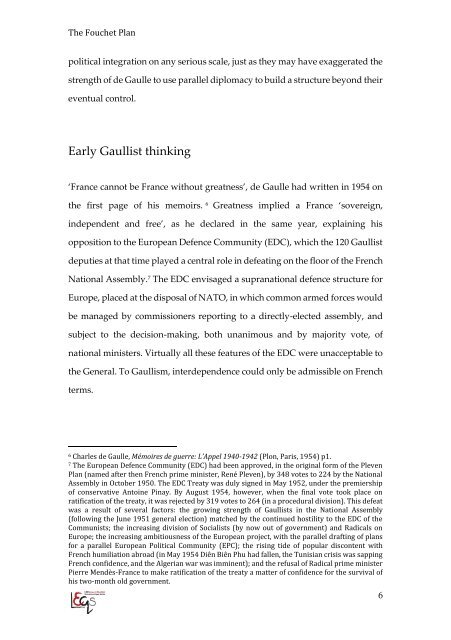The Fouchet Plan De Gaulle’s Intergovernmental Design for Europe
n?u=RePEc:eiq:eileqs:117&r=cdm
n?u=RePEc:eiq:eileqs:117&r=cdm
Create successful ePaper yourself
Turn your PDF publications into a flip-book with our unique Google optimized e-Paper software.
<strong>The</strong> <strong>Fouchet</strong> <strong>Plan</strong><br />
political integration on any serious scale, just as they may have exaggerated the<br />
strength of de Gaulle to use parallel diplomacy to build a structure beyond their<br />
eventual control.<br />
Early Gaullist thinking<br />
‘France cannot be France without greatness’, de Gaulle had written in 1954 on<br />
the first page of his memoirs. 6 Greatness implied a France ‘sovereign,<br />
independent and free’, as he declared in the same year, explaining his<br />
opposition to the <strong>Europe</strong>an <strong>De</strong>fence Community (EDC), which the 120 Gaullist<br />
deputies at that time played a central role in defeating on the floor of the French<br />
National Assembly. 7 <strong>The</strong> EDC envisaged a supranational defence structure <strong>for</strong><br />
<strong>Europe</strong>, placed at the disposal of NATO, in which common armed <strong>for</strong>ces would<br />
be managed by commissioners reporting to a directly-elected assembly, and<br />
subject to the decision-making, both unanimous and by majority vote, of<br />
national ministers. Virtually all these features of the EDC were unacceptable to<br />
the General. To Gaullism, interdependence could only be admissible on French<br />
terms.<br />
6 Charles de Gaulle, Mémoires de guerre: L’Appel 1940-1942 (Plon, Paris, 1954) p1.<br />
7 <strong>The</strong> <strong>Europe</strong>an <strong>De</strong>fence Community (EDC) had been approved, in the original <strong>for</strong>m of the Pleven<br />
<strong>Plan</strong> (named after then French prime minister, René Pleven), by 348 votes to 224 by the National<br />
Assembly in October 1950. <strong>The</strong> EDC Treaty was duly signed in May 1952, under the premiership<br />
of conservative Antoine Pinay. By August 1954, however, when the final vote took place on<br />
ratification of the treaty, it was rejected by 319 votes to 264 (in a procedural division). This defeat<br />
was a result of several factors: the growing strength of Gaullists in the National Assembly<br />
(following the June 1951 general election) matched by the continued hostility to the EDC of the<br />
Communists; the increasing division of Socialists (by now out of government) and Radicals on<br />
<strong>Europe</strong>; the increasing ambitiousness of the <strong>Europe</strong>an project, with the parallel drafting of plans<br />
<strong>for</strong> a parallel <strong>Europe</strong>an Political Community (EPC); the rising tide of popular discontent with<br />
French humiliation abroad (in May 1954 Diên Biên Phu had fallen, the Tunisian crisis was sapping<br />
French confidence, and the Algerian war was imminent); and the refusal of Radical prime minister<br />
Pierre Mendès-France to make ratification of the treaty a matter of confidence <strong>for</strong> the survival of<br />
his two-month old government.<br />
6


